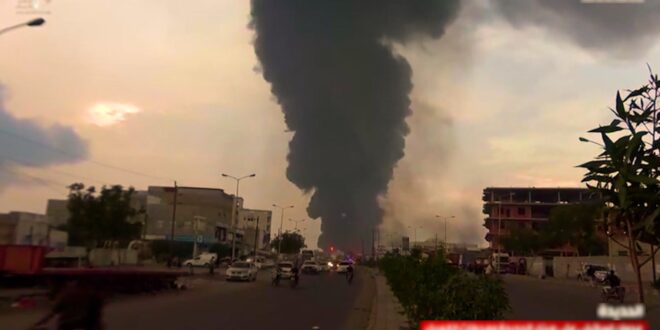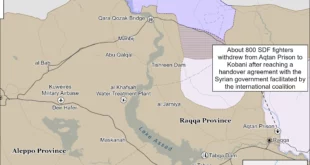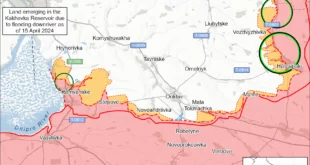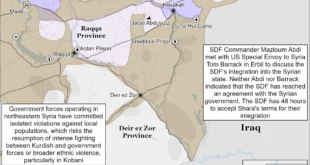British-supplied fighter jet parts linked to “indiscriminate” Israeli attacks on major port, worsening Yemen’s already dire humanitarian situation.
Israeli airstrikes on Yemen’s port-city of Hodeidah have killed and injured up to 155 people since July and caused more than $20 million of damage to a vital harbour.
Most of the port’s fuel storage capacity has been destroyed and four million people left without electricity, with human rights groups warning the “disproportionate” raids could amount to war crimes.
Israel has bombed Yemen twice this year – most recently on Sunday – both times using F-35 fighter jets.
UK manufacturers make “significantly” more than 15% of every F-35, including the ejection seat and rear fuselage.
Keir Starmer’s government continues to let UK firms export F-35 components for use by Israel, despite freezing supplies for other fighter jets due to concerns over civilian harm.
Israel’s first air raid against Yemen’s Houthis on 20 July destroyed at least 33 oil storage tanks and two shipping cranes in Hodeidah port in addition to hitting the city’s central power station at Al-Kathib.
The majority of the port’s 150,000 tonne fuel storage capacity was set ablaze. The strikes caused huge explosions and extensive fires that lasted for days.
It killed up to nine civilians and injured 83, causing more harm to non-combatants than all of the US-UK strikes on Yemen since January.
Sunday’s strikes by Israel similarly targeted three power stations, including hitting Al-Kathib again, as well as four fuel storage tanks at Ras Isa port, to the north of Hodeidah city.
‘Her cries were unbearable’
The strikes have crippled power supplies throughout the governorate of Hodeidah with capacity reduced to just 25% of the electricity needs in one of the hottest and most humid places in Yemen.
Heat and hunger have already converged to increase suffering of children, with the loss of electricity likely to be deadly.
In the aftermath of Sunday’s strikes, Hodeidah resident Mohammed Saleh told Yemeni human rights organisation Mwatana: “I couldn’t sleep all night because of the heat after the power went out, but what broke my heart was seeing my five-month-old daughter’s body covered in heat rash. Her cries from the pain were unbearable.”
The strikes were in retaliation to hundreds of drones and missiles fired towards Israel by Yemen’s Houthi movement since 7 October 2023.
Houthi attacks are believed to have killed only one Israeli civilian, despite targeting Tel Aviv’s Ben Gurion airport on Saturday as prime minister Benjamin Netanyahu was due to land.
Yemen’s artery
Hodeidah, which has been the repeated target of Israel’s response, is the port through which 90% of Yemen’s staples such as wheat, rice and sugar are imported.
Wheat imports through Hodeidah decreased by more than 54% in August from July, partly due to ongoing Red Sea attacks by the Houthis and Israeli airstrikes, according to a UN Food and Agriculture Organisation bulletin.
Two districts in Hodeidah governorate are already living in famine conditions, according to a report by international experts, which projects an expansion of two further districts in Hodeidah falling into famine by the end of this month.
Human Rights Watch described the 20 July Israeli bombing of Hodeidah as an “apparently unlawful indiscriminate or disproportionate attack on civilians that could have a long-term impact on millions of Yemenis who rely on the port for food and humanitarian aid.”
The rights group called on Israel’s allies, including Britain, to “suspend military assistance and arms sales to Israel”, warning that countries which “continue to provide arms to the Israeli government risk complicity in war crimes.”
Yemeni rights monitor Mwatana said Sunday’s strikes on civilian infrastructure, specifically power facilities in Hodeidah, “could amount to war crimes”.
Civilian harm
F-35 fighter jets are assembled by Lockheed Martin in the US with a global supply chain stretching across Britain.
Arms giant BAE Systems has said: “British ingenuity is found on dozens of [the] aircraft’s key components”.
The advanced jets have been central to Israel’s year-long devastating bombardment of Gaza, which has killed more than 42,000 Palestinians.
More recently, the combat aircraft has been deployed in bombing runs in Lebanon and Syria.
Israeli attacks on Lebanon have killed around 2,000 people over the last year, with an F-35 confirmed to have bombed a Hezbollah commander in Beirut on 20 September in a raid which also left three children and seven women dead.
Iran’s ballistic missile strikes against Israel on Tuesday targeted several air bases, including Nevatim where F-35 squadrons are stationed. Satellite imagery shows some damage to a hanger at Nevatim following Iran’s attack.
Proxy war?
The Houthis, also known as Ansar Allah, are often erroneously referred to as an Iranian proxy due to Tehran’s support of their weapons manufacturing, training of its fighters, and providing components for building ballistic missiles, cruise missiles and drones.
Britain had a similar relationship with Saudi Arabia when the Kingdom was carrying out its bombing campaign in Yemen against the Houthis from 2015 to 2022, in an air war that killed and injured more than 19,000 civilians.
Britain supported the Saudi-led campaign in Yemen “in every practical way short of engaging in combat”, then foreign secretary Philip Hammond said, despite numerous documented incidents of probable war crimes.
The conflict resulted in the world’s worst humanitarian crisis and cholera outbreak in modern history, with the UN Development Agency attributing 377,000 deaths from the impact of the war.
The estimated total value of UK arms sales to Saudi Arabia is over £29 billion since March 2015.
In supplying F-35 fighter jet components for use in Israel’s escalating bombing campaign, questions are once again raised over British weapons manufacturers’ complicity in war crimes.
Human rights lawyers are set to challenge Starmer’s stance on F-35 exports at London’s High Court next month, having already written to ministers warning them they could face “criminal liability”.
 Eurasia Press & News
Eurasia Press & News




